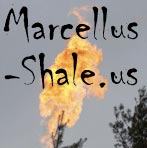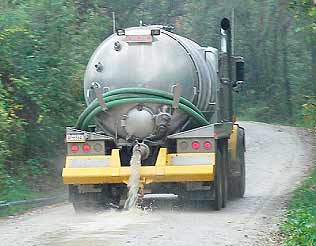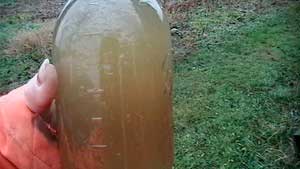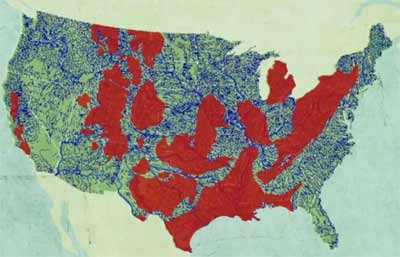Biblio
Frac Trucks... some call them soup trucks, kettle trucks or frack trucks. Some of these tanker trailers are used to haul frac sand or cement for gas well casings. Whatever the name or use of these various trucks, they usually catch your attention when they are parked roadside or travelling down the highway as oversize loads.
All kinds of weird plumbing, pipes and gauges not seen in everyday life. Some carry containers of frac fluids or other devices that you never saw anything quite like before. Equipment used for installing and fracking Marcellus Shale gas wells.
According to the Environmental Working Group, a research and advocacy group based in Washington, drilling companies are side-stepping a permitting requirement for the use of diesel fuel in their fracturing fluids by using similar petroleum distillates that contain the same toxins as diesel, but require no permitting.
The report also cites evidence that drilling companies continue to inject diesel fuel underground without the proper permits.
Includes public comments.
Statement by the National Council of Churches of Christ (2008). A Call for Faithful Stewardship of God’s Creation: Reflections on Natural Gas Drilling and Leasing. National Council of Churches in Christ. Published by Beach Lake United Methodist Church, Beach Lake, PA.
Beach Lake United Methodist Church. Located in Beach Lake, Pennsylvania, near the New York Catskills.
"Biblical and theological considerations are commended to everyone, whether or not they have been approached about a gas lease and regardless of whether they have signed one. People are encouraged to think as broadly as possible and learn all they can in order to make the best possible decisions in the future.
Purpose: To involve church members, wherever in the United States gas drilling is operative or proposed, in biblical and theological dialogue, in order to equip and motivate them to engage in discussions and decisions in their respective communities."
Since Pennsylvania’s gas drilling boom ramped up in 2008, companies have been fined regularly for environmental accidents — $23,500 here for spilling 5,000 gallons of waste, $15,557 there for spilling 295 gallons of hydrochloric acid. The fines often amount to slaps on the wrist for companies that stand to make hefty profits from their wells.
But the penalties just got a lot more serious for an owner of Kansas-based Swamp Angel Energy and for the company’s site supervisor, who pleaded guilty last week to felony violations of the Safe Drinking Water Act.
As part of a plea agreement with the U.S. attorney for western Pennsylvania, part-owner Michael Evans, 66, of La Quinta, Calif., and John Morgan, 54, of Sheffield, Penn., admitted dumping 200,000 gallons of brine – salty wastewater that’s created in the drilling process – down an abandoned oil well. The maximum penalty for both Evans and Morgan is three years in prison, a fine of $250,000, or both. Sentencing will be June 24. (See follow-up below). Attorneys for both men declined to comment.
Swamp Angel Energy was drilling in the Allegheny National Forest, in McKean County in northwestern Pennsylvania, and the brine was dumped just outside the border of the federal land. In mid-December, a federal judge overturned a ruling that had essentially banned drilling in the Allegheny Forest...
Follow-Up | U.S. EPA Compliance and Enforcement Criminal Case Activities (nz):
EPA's Criminal Enforcement program investigates and helps to prosecute environmental violations which seriously threaten public health and the environment or involve conduct that may be willful, intentional, or deliberate.
Besides environmental violations, the cases may also have associated U.S. criminal code violations such as conspiracy, false statements, witness tampering, or interfering with a law enforcement investigation. Criminal enforcement sanctions -- which may include incarceration of individuals in addition to monetary fines against individuals, businesses, or corporations represent the enforcement program's strongest sanction and deterrent.
John Morgan and Michael Evans (PDF) (1 pg, 32K)
Acting United States Attorney Robert S. Cessar announced today, June 24, 2010, that a resident of Sheffield, Pennsylvania and a resident of La Quinta, California, have been sentenced in federal court in Erie as a result of their felony convictions for violating the Safe Drinking Water Act by unlawfully injecting brine produced from an oil drilling operation.
United States District Judge Sean J. McLaughlin imposed the sentences on John Morgan, age 54, of Sheffield, Pennsylvania, and Michael Evans, age 66, of La Quinta, California. Mr. Morgan received a sentence of three years probation, a $4,000 fine, eight months home detention and eighty hours community service. Mr. Evans received a sentence of three years probation, a $5,000 fine, ten months home detention and one hundred hours community service.
Minnesota based Blog by Shelly Thomas. Lively, entertaining, with well organized links, videos, photos. Covers UK, Canadian, international and U.S. issues. Updated regularly since April 2008.
Futurism Now is about the energy, challenges, and green jobs of the future. There are big changes coming and Futurism Now attempts to find the news and information people will need to adapt to their changing lifestyles.
See: Take the Tar Sands Pledge of Resistance
“We are in a crisis situation. In order to bring global CO2 back to the safe zone, we need a global shift now,” writes Beyond Talk. “These and other tar sands operations amount to the single-most destructive and unsustainable project on earth. (See this brief H2oil segment for an excellent introduction.)”
See: H2Oil: An Explanation of the Tar Sands in Alberta
Example Feed from 10/3/2010:
- Worst Climate Change Video Ever Made
- Activists Vow to End Mountaintop Removal
- The End of the World As We Know It
- More Downsides to Natural Gas
- Fighting Big Coal With Some Success
- UN Urges Governments to Build a Climate Change Foundation
- H2Oil: An Explanation of the Tar Sands in Alberta
- Recent Climate and Politics News
- Eco Study and Inspiration
- Pacific Walrus Threatened by Global Warming
OpenSecrets.org Launches 'Fueling Washington' Series Exploring Oil and Gas Industry's Political Influence
The Center for Responsive Politics today launches "Fueling Washington," a week-long series of reports exploring the oil and gas industry's evermore intimate relationship with the federal government and the people elected to make the nation's laws.
With a president promising comprehensive climate change legislation and a massive oil spill in the Gulf of Mexico, the fossil fuels industry has dominated political discourse this year in ways it never before has.
And such debate comes at a time when the most interested of parties -- environmentalists, alternative energy producers, the oil and gas industry itself -- are pouring record amounts of money into national politics in an attempt to bend rules, regulations and politicians their way.
Using the tools of our "Fueling Washington" series, you can investigate the tide of influential cash from these deep-pocketed -- and sometimes not so deep-pocketed -- special interest groups. Below, we specifically highlight contributions and lobbying of three special interests with significant stakes in Congress' post-oil spill debates about climate change, greenhouse gas emissions, energy policy and jobs.
Celebrating our 25th anniversary in 2008, the Center for Responsive Politics is the nation's premier research group tracking money in U.S. politics and its effect on elections and public policy.
Nonpartisan, independent and nonprofit, the organization aims to create a more educated voter, an involved citizenry and a more transparent and responsive government.
The Collaborative on Health and the Environment (CHE) is an international partnership committed to strengthening the scientific and public dialogue on the impact of environmental factors on human health...
Underlying all of CHE's activities is a commitment to strong, uncompromised science. CHE Partners share the conviction that under conditions of scientific uncertainty, when evidence of the potential for harm to human health and the environment is scientifically compelling, precautionary measures that emphasize exposure prevention should be undertaken.
After decades of declining US natural-gas production, a new and powerful drilling technique that fractures rock with high-pressure fluid is opening up vast shale-gas deposits in Texas, Colorado and now many parts of the Northeast.
Hydraulic fracturing or "fracking" injects tons of toxic chemicals into the ground in order to break up shale beds rich in natural gas. Researchers, health and environment experts, and community groups have expressed strong concerns about these chemicals contributing significantly to air and water pollution.
The shale gas reserves, however, are seen by a number of companies, states and landowners as an enticing economic opportunity that could reap billions while lowering residential heating bills. The Environmental Protection Agency began public hearings last March to investigate the issue, and a number of citizen protests have recently been held in regions where fracking is already being undertaken or proposed.
This CHE Partner call featured four leading researchers in different fields of expertise to discuss the potential human and environmental health implications of fracking.
Featured speakers included:
- Sandra Steingraber, PhD, author of Living Downstream
- Theo Colborn, PhD, President, The Endocrine Disruption Exchange (TEDX)
- Tony Ingraffea, PhD, PE, Cornell University
- Weston Wilson, Retired EPA Region 8.
See: Poisoned profits : the toxic assault on our children
See: The Case for a Truth and Reconciliation Commission on Toxic Hazards
Sharon Wilson, Texas OGAP Organizer was flown to EPA headquarters in North Carolina to present four case studies of health impacts caused by natural gas extraction in the Barnett Shale. She met with the top rule makers in the Office of Air Quality Planning and Standards who are working on new rules for the oil and gas industry.
See: Barnett Shale Health Impacts - Case Studies
She brings our attention to the disruptive health impacts of mountain-top removal for frac sand in Chippewa, Wisconsin. Read her post on Bluedaze, Mountain Top Removal for Hydraulic Fracturing Sand.
UB geologist Tracy Bank and colleagues found that uranium and hydrocarbons in Marcellus shale are not just physically, but also chemically, bound.
Scientific and political disputes over drilling Marcellus shale for natural gas have focused primarily on the environmental effects of pumping millions of gallons of water and chemicals deep underground to blast through rocks to release the natural gas.
But University at Buffalo researchers have now found that that process -- called hydraulic fracturing or "fracking"-- also causes uranium that is naturally trapped inside Marcellus shale to be released, raising additional environmental concerns.
The research will be presented at the annual meeting of the Geological Society of America in Denver on Nov. 2.
See: Casey Junkins. November 20, 2010. The Intelligencer Wheeling News-Register. "Profs: Wells Pose Threat: Fracking lets loose uranium, other hazards".
Dan Bain, assistant professor of geology at Pitt, and Radisav Vidic, professor of environmental engineering at Pitt, expressed concern about drilling for gas in areas throughout West Virginia and Pennsylvania because of the region's great history of coal production.
"Pennsylvania is filled with abandoned coal mines. I don't want to see this happen with gas drilling," Bain said.
An AB Resources well site about 6 miles outside Moundsville's city limits was home to a June 7 explosion, due to workers breaching a pocket of methane in an old coal mine. After injuring several workers, the charge ignited a large fireball that burned for several days.
Agriculture officials have quarantined 28 beef cattle on a Pennsylvania farm after wastewater from a nearby gas well leaked into a field and came in contact with the animals.
The state Department of Agriculture said the action was its first livestock quarantine related to pollution from natural gas drilling. Although the quarantine was ordered in May, it was announced Thursday.
Carol Johnson, who along with her husband owns the farm in north-central Pennsylvania, said she noticed in early May that fluids pooling in her pasture had killed the grass. She immediately notified the well owner, East Resources Inc.
"You could smell it. The grass was dying," she said. "Something was leaking besides ground water."
The Johnsons' farm sits atop the Marcellus Shale, a layer of rock that lies under swaths of West Virginia, Pennsylvania, New York and Ohio. As ProPublica has reported, reports have proliferated of groundwater pollution, spills and other impacts of hydraulic fracturing, a drilling technique that injects massive amounts of water, sand and chemicals underground to break up the formations that hold the gas.
Independent vibrant, Canadian online magazine based in British Columbia.
Earlier this year at Two Island Lake north of Fort Nelson, two corporations, Encana and Apache, blasted an estimated 5.6 million barrels worth of water along with 111 million pounds of sand and unknown chemicals to fracture apart dense formations of shale over a 100 day period, or what Parfitt calls "the world's largest natural gas extraction effort of its kind."
...Many experts argue that shale gas could retire coal-fired plants or slow down the deployment of wind and solar projects altogether. Others contend that shale formations deplete too quickly to offer secure supplies for the future. At the same time, the "shale gale" has also created abiding controversies about water use, groundwater contamination and the regulation of the industry from Wyoming to Quebec.
Fracture Lines, commissioned by the Program on Water Issues at University of Toronto's Munk Centre, not only sheds light on the scale of development from British Columbia to New Brunswick but highlights industry's largely unregulated water use.
"In the absence of public reporting on fracking chemicals, industry water withdrawals and full mapping of the nation's aquifers, rapid shale gas development could potentially threaten important water resources if not fracture the country's water security," concludes Parfitt. (Parfitt, 2010)
Parfitt, B. Fracture Lines: Will Canada’s Water be Protected in the Rush to Develop Shale Gas? Program on Water Issues Munk School of Global Affairs at the University of Toronto, September 15, 2010.
Bob and Lisa were told by their doctor to move out of their home withing 48 hours because it was too dangerous for them to stay after they were diagnosed with drilling chemicals in their blood and organs.
Videos and posting by Bluedaze Sharon Wilson.
Brandon Evans. 9/27/2010. Fight for Survival. Wise County Messenger. Online Edition.
It doesn't have to be this way. There are affordable emission controls that industry could use to prevent 90% of the emissions. These are some of the best practices least destructive practices described in DRILL RIGHT TEXAS: Best oil & gas development practices for Texas. Industry refuses to use control technology unless it is mandated.
Before you go all weird and start attacking Texas, have a look at this map and know that they are finding more shale areas everyday, everywhere, all across the globe. Shale gas is the biggest scam ever played on the human race.
Keep drilling toxics out of our drinking water.
Tell your Senators and Representatives to support the FRAC Act.
Frac Tech is one of the smaller companies mentioned in the memorandum to Members of the Subcommittee on Energy and Environment from Chairman Henry A. Waxman and Subcommittee Chairman Edward J. Markey Examining the Potential Impact of Hydraulic Fracturing. (PDF)
Frac Tech describes itself as “one of the largest and fastest growing land stimulation companies.”
Little is known about the practices of these and other small and medium sized companies that provide fracturing services across the country.
Frac Tech's CEO Dan Wilk received one of the eight letters from this Committe on February 18, 2010. They are listed in this document:
Energy & Commerce Committee Investigates Potential Impacts of Hydraulic Fracturing.
See Shale Maps of the U.S, World, Australia, China, Eastern Europe and the Middle East.
See: Jaime Adame. "Cisco's Frac Tech Grows". August 7, 2010. Abilene Reporternews Online.
Not So Fast, Natural Gas: Why Accelerating Risky Drilling Threatens America’s Water
Some energy analysts are predicting that natural gas will be the fuel of the future if advances in drilling technology allow drillers to tap into domestic shale rock formations on a large scale. But because of the impacts that the technology can have on water, natural gas could become our next energy disaster.
Food & Water Watch works to ensure the food, water and fish we consume is safe, accessible and sustainably produced.
Learn more: read about our victories.
See: Poisoned Profits
See: Blue Covenant
See: Tox Town

























